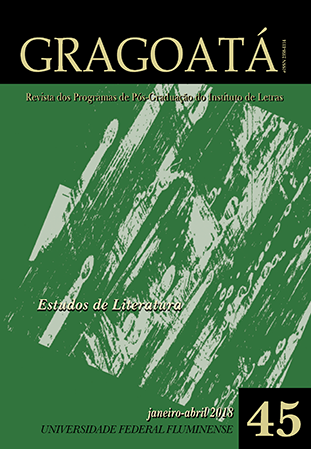O poeta insone
DOI:
https://doi.org/10.22409/gragoata.v23i45.33571Palavras-chave:
Carlos Drummond de Andrade, João Cabral de Melo Neto, lírica e sociedade, lírica moderna, Comunismo.Resumo
O objetivo do artigo é o de compreender, por meio da análise do poema “Campo, chinês e sono”, de A rosa do povo (1945), a maneira pela qual Carlos Drummond de Andrade responde, crítica e criativamente, às composições cabralinas de Pedra do sono, pautadas pela tentativa de dessubjetivação e esquecimento de si. Para esse fim, o texto se vale da correspondência entre os autores e de formulações teóricas do próprio Cabral. A resposta poética e política de Drummond em “Campo, chinês e sono”, no qual se pressente utopicamente a construção de uma sociedade justa e emancipada, permite repensar também a suposta intransitividade de alguns dos poemas herméticos de A rosa do povo.
---
Downloads
Downloads
Publicado
Edição
Seção
Licença
AUTORIZAÇÃO
Autores que publicam em Gragoatá concordam com os seguintes termos:
Os autores mantêm os direitos e cedem à revista o direito à primeira publicação, simultaneamente submetido a uma licença Creative Commons Atribuição 4.0 Internacional (CC BY 4.0), que permite o compartilhamento por terceiros com a devida menção ao autor e à primeira publicação pela Gragoatá.
Os autores podem entrar em acordos contratuais adicionais e separados para a distribuição não exclusiva da versão publicada da obra (por exemplo, postá-la em um repositório institucional ou publicá-la em um livro), com o reconhecimento de sua publicação inicial na Gragoatá.
A Gragoatá utiliza uma Licença Creative Commons - Atribuição CC BY 4.0 Internacional.











